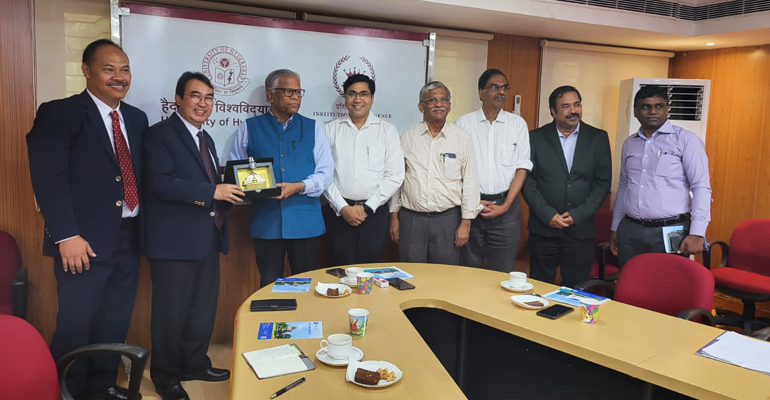IPB University Represents Indonesia at G20 Forum ‘Technical Workshop on Climate Resilient Agriculture’ in India

IPB University represented the Indonesian delegation in the ‘Technical Workshop on Climate Resilient Agriculture G20 Forum’ in Hyderabad, India (4-6/9). Indonesia sent two delegates namely Prof Ernan Rustiadi and Prof Edi Santosa. Both are IPB University professors from the Faculty of Agriculture (Faperta).
The meeting was attended by more than 10 delegates from G20 countries including Indonesia, India, USA, Japan, Canada, Oman, Saudi Arabia, South Africa and Mauritania. In addition, more than 15 representatives of international research institutions including the International Water Management Institute (IWMI), International Rice Research Institute (IRRI), International Maize and Wheat Improvement Centre (CIMMYT) and World Agroforestry (ICRAF). In addition, various renowned research institutions in India such as the Indian Council of Agricultural Research (ICAR), Negotiated Indirect Cost Rate Agreement (NICRA), International Crops Research Institute for the Semi-Arid Tropics (ICRISAT) and universities in Hyderabad.
Prof Ernan Rustiadi, Vice Rector of IPB University for Research, Innovation and Agromaritime Development gave a note on behalf of the Indonesian delegation regarding the importance of collaboration across G20 institutions in building climate resilient agriculture (CRA). This step is important to continue and strengthen the previous G20 Presidency by Indonesia.
“India as the G20 Presidency in 2023, is expected to be able to ground and become a bridge between institutions for various inventions and new technologies to improve CRA,” said Prof Ernan.
Prof Edi Santosa, IPB University Professor from the Department of Agronomy and Horticulture, Faperta presented ‘Climate Solutions and Build Innovation on Climate Resilience in Agriculture Higher Education’. His presentation began with the situation of Indonesia’s vulnerability as an agromaritime country related to climate events, such as floods and droughts. The intensity, area coverage and impact continue to increase from year to year.
The presentation continued with how education reform was carried out in Indonesia through Merdeka Belajar Kampus Merdeka (MBKM). “IPB University responds to this policy through redesigning the K2020 curriculum, strengthening techno-sociopreneurship, applying technology in the learning process and initiating a green campus. We also develop study programmes that are directly related to CRA such as Smart Agriculture (S1) and Environmental Engineering and Management (D4),” he explained.
Prof Edi also explained some of the achievements of IPB University lecturers. Of the hundreds of inventions developed, some of them are useful for improving aspects of CRA, such as new superior varieties that are more resilient to environmental stress, water-saturated cultivation technology, biopesticides and FARADS technology that saves water and fertilisers. Not only that, a number of other inventions include plasma bubble technology to save production costs and be environmentally friendly in shrimp and pond fish cultivation, inventions related to circular economy such as the use of palm oil waste and the use of black soldier fly (BSF).
“In addition, IPB University is also committed to disseminating technology to the community, including environmentally friendly technology through the Tani and Nelayan Centre using the Digitani platform,” he said.
On the sidelines of the meeting agenda, a visit was made to the ICAR-Indian Institute of Millets Research (IIMR) which is the Global Centre of Excellence on Millets (Sree Anna). IIMR in Hyderabad operates a factory processing various types of millets (pearl millet, foxtail millet, sorghum, finger millet, kodo millet, barnyard millet) into various types of food. IIMR is also the centre of nutrihub, a millet-based food industry startup in India, which has produced many successful startups.
A visit was also made to the ICAR-Central Research Institute for Dryland Agriculture (CRIDA) in Hyderabad. CRIDA develops dryland crop varieties such as cactus, maize, pulses including groundnuts, animal feed and dryland-related mechanisation equipment for smallholder farmers. CRIDA operates a growth chamber facility for climate change and an in situ climate change simulator with modified CO2 and ambient temperature.
Prof Ernan and Prof Edi also visited Hyderabad University which has strong competence in information technology and engineering. The visit was received by the Rector (Prof Basuthkar J Rao) accompanied by the Vice Director of International Cooperation (Prof Alok Kumar Mishra), Dean of School of Life Sciences (Prof Nadimpalli Siva Kumar), Chairman of Centre for Advanced Studies in Electronics Science and Technology (Prof Samrat L Sabat) and Director of ASPIRE-BioNEST Incubator (Prof S Rajagopal).
“The IPB University team also had the opportunity to discuss with the entire faculty in the Department of Plant Science which is the best department in India in research performance and innovation. We also visited the ASPIRE-BioNEST Incubator and discussed with biotechnology industry startups that focus on finding new catalysts, new food biomaterials, new medicines, new equipment, cells and so on,” said Prof Ernan.
Prof Basuthkar J Rao, Rector of Hyderabad University is very open to collaboration in research and publications, as well as exchange of students and lecturers. He hoped that collaboration with IPB University could be established in the immediate time ahead. (*/Rz) (IAAS/RUM)



